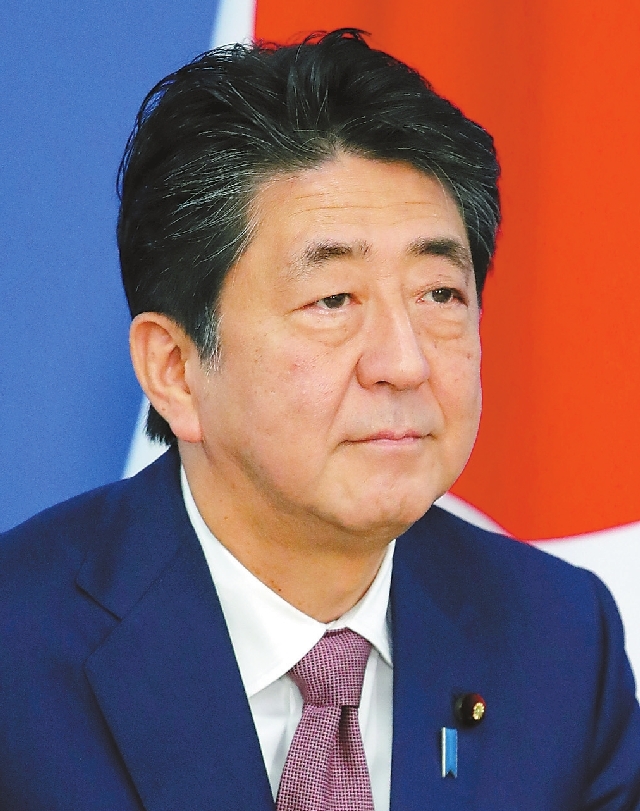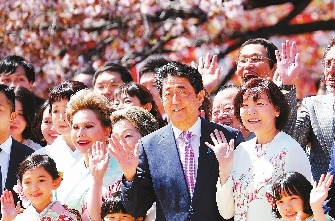


SHINZO ABE entered the history books as Japan’s longest-serving prime minister Wednesday, but many of his ambitious goals, including a constitutional revision to strengthen the military, appear far from reach. Wednesday marks Abe’s 2,887th day in office, topping the record previously set by Taro Katsura, a revered politician who served three times between 1901 and 1913. The 65-year-old is also the second-longest-serving leader of the Group of Seven major economies behind only German Chancellor Angela Merkel, who has been in office since 2005. “Day by day, I have made efforts to achieve the policies that I have promised, and because of these daily efforts I’m here to mark this day,” Abe told reporters Wednesday. Abe was groomed for politics from birth and has cemented his power with shrewd diplomacy, unwavering nationalism and a knack for surviving scandal. At home, he has championed an economic drive that carries his name — Abenomics — while abroad he has sought to curry favor with powerful leaders, especially U.S. President Donald Trump. “Abe’s tenure has made Japan an island of political stability even as other advanced industrial democracies have suffered from weak, unpopular, or short-lived governments over the course of the decade,” noted Tobias Harris, an analyst at Teneo. Abe has also shown the ability to rise from the ashes, reviving his career after a devastating first term in office cut short by political strife and personal illness. And he has not been above poking fun at himself either, dressing up as Super Mario to give a zany preview of the Tokyo 2020 Olympics, and scoring mock tries in a video ahead of the Rugby World Cup. Abe seemed born to lead Japan, the latest in three generations of powerful politicians. His grandfather, Nobusuke Kishi, was a World War II Cabinet member briefly arrested for war crimes — but never charged — who became prime minister and forged an alliance with the United States. His father, Shintaro Abe, rose to be foreign minister but never won the top job. Shinzo Abe took his father’s parliamentary seat in 1993 following his death. Abe cut his teeth by taking a hawkish line on North Korea and became the hand-picked successor to the popular former Prime Minister Junichiro Koizumi, whom he served as an eager and earnest deputy. When he finally reached the top of the greasy pole in 2006, he became the country’s youngest-ever prime minister — aged just 52 — and the first born after World War II. But he left office abruptly 12 months later, citing debilitating bowel problems caused by exhaustion and stress, becoming the first in a series of short-lived premiers, each of whom lasted around a year. Recovered, he swept back to power in 2012 on a pledge to reignite Japan’s once-booming economy and carry out “diplomacy that takes a panoramic perspective of the world map.” Abe has confessed that he was encouraged to seek a path back to power by reading a biography of Britain’s wartime leader Winston Churchill, titled “Never Despair.” On the economic front, he pioneered a multi-pronged policy dubbed “Abenomics,” a combination of generous government spending and central bank monetary easing. He has also pushed ahead with policy reforms intended to boost the country’s flagging birth rate, including by increasing access to pre-schools for toddlers. Japan — the world’s third-largest economy — is enjoying its longest period of expansion in more than a decade, but inflation is stubbornly low as consumer spending remains underwhelming. In domestic policy, Abe has pursued a nationalist agenda, proposing to change Japan’s U.S.-imposed pacifist constitution in his election manifesto so it could turn its self-defense forces into a full-fledged army. On the international stage, he has worked hard to build a close personal relationship with Trump in a bid to protect Japan’s key alliance despite the U.S. president’s “America First” mantra. He famously visited Trump in his glittering New York tower before the tycoon was even sworn in to the White House. The two leaders have since forged personal ties at summits and on golf courses. Abe has also cozied up to Russia’s Vladimir Putin and tried to mend ties with China. Abe is married to Akie, the daughter of a prominent businessman known for her love of South Korean culture. The couple have no children. In the early days of his political career, Japanese media focused on how he would walk hand-in-hand with his wife — an unusual sight in a country where politicians’ partners rarely appear in public. Abe’s grip on power remains firm as he passes the landmark, with his tenure likely to last until at least September 2021 and no clear successor yet on the horizon. But the prime minister has plenty of unfinished business, saying earlier this year after a Cabinet reshuffle that he hoped to “take on the challenge to create a new country.” Abe on Wednesday renewed his pledge to beat deflation, tackle Japan’s aging and declining population and achieve the constitutional revision. But opposition parties have refused to move forward with procedures for the revision. In his second term, Abe has so far survived a spate of scandals, including his own, his wife’s and others in his Cabinet. A recent one involved his annual cherry blossom viewing party. He had to cancel one planned for next spring after he was criticized over the use of taxpayer money for thousands of guests from his election constituency and private support groups. Speaking to reporters Wednesday to mark the record, he was peppered with questions about the latest scandal, which shows little sign of going away. Despite recent missteps, however, experts say Abe’s ruling coalition faces no major threats in parliament, and there are no obvious pretenders to his office. “There seem to be no strong rivals inside the LDP, and the prime minister’s political foundation inside the party is stable,” said the conservative Yomiuri Shimbun. With his place in the history books secure, Abe is expected to focus on several difficult goals in coming years, experts say: the constitutional revision, the release of Japanese kidnapped by North Korea and the resolution of a long-standing territorial dispute with Russia. “The chances of achieving his ambitious goals are very, very slim,” said Shinichi Nishikawa, professor of political science at Meiji University in Tokyo. Chief Cabinet Secretary Yoshihide Suga cited Abe’s strong leadership and economy-first policies as the main reasons for his long tenure in office. Opponents, however, said Abe’s time in office has led to cronyism, autocracy and caused more damage than benefit to democracy. “The administration is without legacy or achievement,” said Tetsuro Fukuyama, a senior lawmaker in the main opposition Constitutional Democratic Party of Japan. “It’s not helping the people’s lives, and the disparity between the riches and the poor is widening.” Experts say Abe’s long leadership is not necessarily because voters actively support his policies, but is in part based on reluctant support for his party in the absence of viable liberal-center contenders after the 2009-2011 rule of the now-defunct Democratic Party of Japan ended in disappointment and the party broke into smaller groups. “In a way, Abe has since been scoring default victories,” said Takashi Mikuriya, a University of Tokyo politics professor. (SD-Agencies) | 
